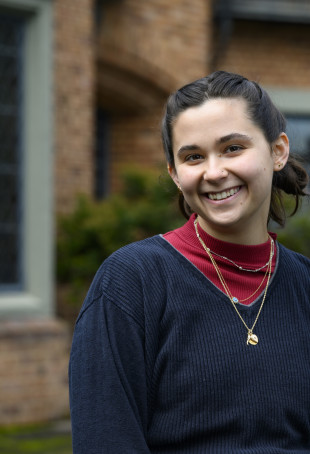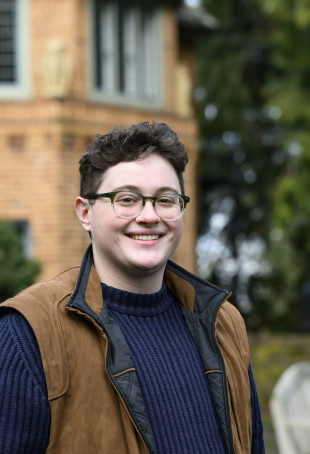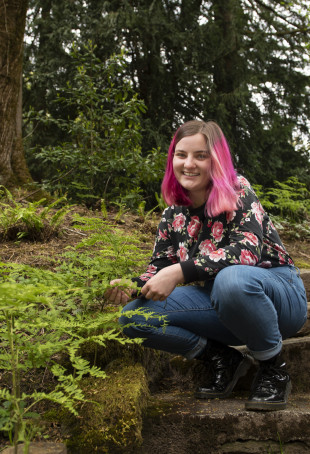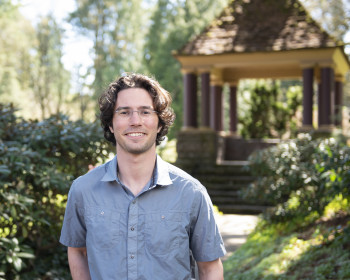42nd Annual Gender Studies Symposium Focuses on Science and Medicine
This year’s Gender Studies Symposium will explore the ways that science and medicine intersect with gender and sexuality to create knowledge, establish authority, and shape policy. The symposium runs from March 8-10.
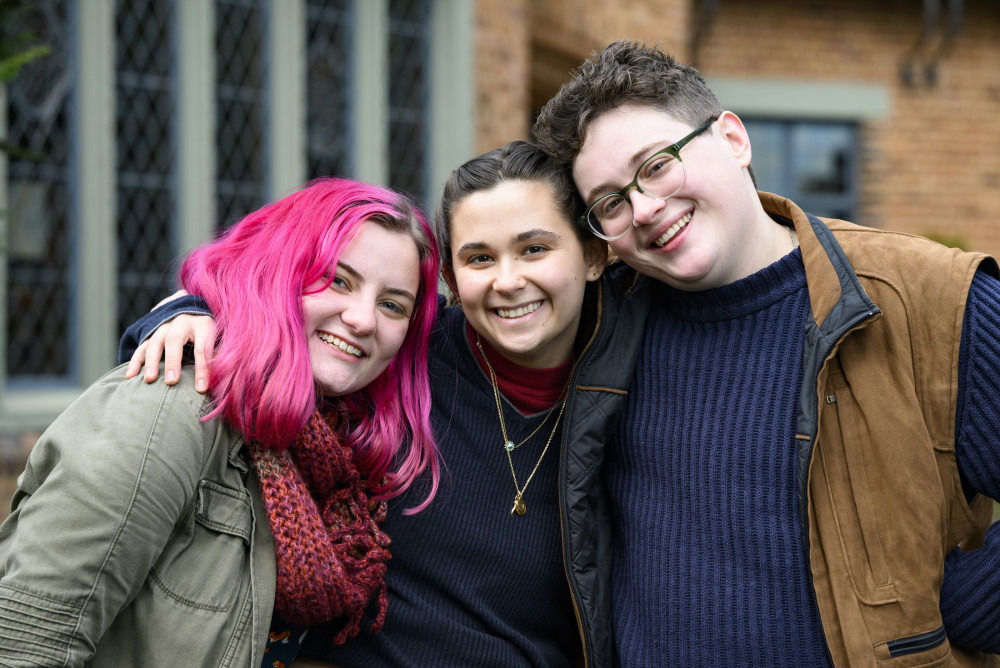
Photo credit: Nina Johnson
by Mackenzie Kier BA ’26
In what ways has science shaped our interpretations of different kinds of bodies? How does scientific knowledge affirm or challenge understandings of gender and sexuality? How have racialized concepts of gender and sexuality been produced through scientific research and medical practice?
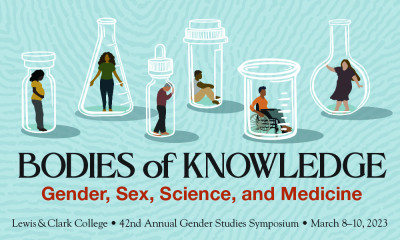
The symposium’s jam-packed three-day schedule includes two keynote speakers, three workshops, nine panels, a poetry reading, and an art show. All scheduled events will take place in person, with the Wednesday keynote presentation also available for remote viewing (see the symposium website for details).
The symposium is organized by a trio of undergraduate student cochairs: Eli Bricknell BA ’23, Sofia Reeves BA ’23, and Julia Salomone BA ’23. Kimberly Brodkin, associate professor with term of humanities, serves as the symposium’s director.
- Julia Salomone BA ’23
I am currently the cochair of the Gender Studies Symposium. Chairing the symposium while simultaneously writing my thesis on reproductive health has empowered me to look beyond the classroom and explore my interests further.
Environmental Studies | Gender Studies | Parkland, FloridaMore about Julia - Eli Bricknell ’24
I am a cochair for this year’s Gender Studies Symposium. I had only attended the events before, so this is my first year in a leadership role. I am really thankful we have so many amazing symposia at L&C!
Sociology and Anthropology | Gender Studies | Seattle, Washington; Kalamazoo, MichiganMore about Eli - Sofia Reeves BA ’23
I think every student at Lewis & Clark can get something special from one of the student-led symposia, either by attending or being a part of organizing the event. There is knowledge to be gained for every person who attends the symposium.
Biology | Gender Studies | Sacramento, CaliforniaMore about Sofia
The symposium’s focus on science and medicine emerged during the group’s planning sessions last spring and summer. “A lot of things were on our minds, especially reproductive justice and anti-trans legislation,” said Brodkin. “We wanted this year’s symposium to provide a context and framework for thinking about those issues.”
Bricknell, a sociology and anthropology major and gender studies minor, agrees that the event highlights issues that are relevant to gender-focused health care and access to care. “I have been very lucky to have some amazing people in my life who have supported me with finding care during my transition. I would like to extend some of that support back to my community.”
The symposium’s theme also resonates with Salomone, an environmental studies major and gender studies minor. “As a young woman hoping to enter the public health field professionally, the intersection of science, medicine, and gender could not feel more important to me,” she said. Gendered perceptions of science and medicine affect every aspect of our lives, and I can’t wait to hear the conversations the symposium prompts.”
This year’s symposium features two keynote presentations:
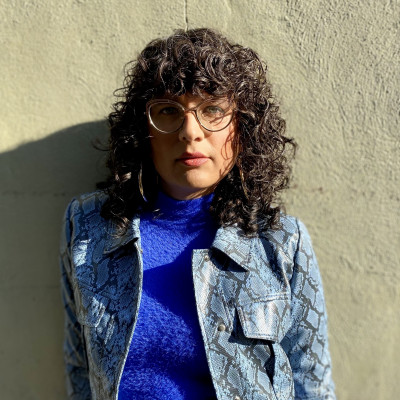
Thursday, March 9: Dr. Dána-Ain Davis, professor of urban studies and anthropology at Queens College and author of Reproductive Injustice: Racism, Pregnancy, and Premature Birth, will present “Black Anti-bodies and the Repercussions of Obstetric Racism.”
“I am most excited for Dr. Dana-Aín Davis’s keynote,” said Reeves, a biology major and gender studies minor. “I hope to learn a lot from hearing Davis speak on the intersection of race and gender for Black bodies in medicine throughout history.”
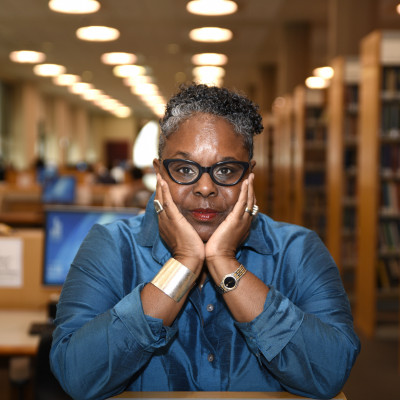
On March 9, as part of a full menu of other activities, guests are invited to attend The Vernacular Possibility of Transmasculine Representation: A Conversation about the award-winning series BROTHERS. This event will be moderated by Melanie Kohnen, associate professor of rhetoric and media studies, and will feature Mal Spicer BA ’23; Emmett Jack Lundberg, creator, director, and producer; and Sheyam Ghieth, director and producer.
This year’s art show, curated by Anika Bednar BA ’23, Burton Scheer BA ’25, and Sascha Tappan BA ’25, encourages viewers to reflect on their own and others’ experiences around gender, science and medicine. The exhibit is designed to spark conversations around questions such as, “How do we stay conscious of the disparate treatment of bodies?” and “How do our relationships with our bodies inform our creative processes?” The exhibit will be on display in Watzek Library’s atrium through April 3 and will include an online gallery (watch the symposium website for a link).
The 42nd annual Gender Studies Symposium promises to be a robust event. “Our theme is important to the L&C community because scientific and medical knowledge, especially as they relate to sex and gender, permeate our lives on a daily basis,” said Reeves. “By seeking to understand this reality—and opening ourselves up to hear about and learn from current research in these fields as well as individual experiences—we all become more informed and compassionate.”
More Newsroom Stories
Public Relations is located in McAfee on the Undergraduate Campus.
MSC: 19
email public@lclark.edu
voice 503-768-7970
Public Relations
Lewis & Clark
615 S. Palatine Hill Road MSC 19
Portland OR 97219
